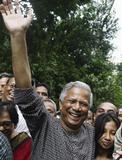
Reuters
Muhammad Yunus waves at his fans outside his house in Dhaka, yesterday. Yunus and the Grameen Bank he founded won the 2006 Nobel Peace Prize on Friday for grassroots efforts to lift millions out of poverty that earned him the nickname 'banker to the poor'.
OSLO, (Reuters):
Bangladeshi economist Muhammad Yunus and the Grameen Bank he founded won the 2006 Nobel Peace Prize on Friday for grassroots work to lift millions out of poverty that earned him the nickname 'banker to the poor'.
Yunus, 66, set up a new kind of bank in 1976 to lend to the neediest, particularly women, in Bangladesh, enabling them to start up small businesses without collateral.
In doing so, he pioneered microcredit, a system copied in more than 100 nations from the United States to Uganda. U.N. Secretary-General Kofi Annan, presidents and prime ministers hailed the award, the first Nobel Peace Prize to a Bangladeshi.
"It's very happy news for me and also for the nation," Yunus told reporters at his home in the Bangladeshi capital, Dhaka, after he won from a field of 191 candidates.
"Now the war against poverty will be further intensified across the world. It will consolidate the struggle against poverty through microcredit in most of the countries," he said. "There should be no poverty, anywhere."
Path to peace
In awarding a prize more traditionally given to those who sign treaties to end wars or fight for human rights, the secretive five-member Norwegian Nobel Committee said eliminating poverty was a path to peace and democracy.
"Lasting peace cannot be achieved unless large population groups find ways in which to break out of poverty. Microcredit is one such means. Development from below also serves to advance democracy and human rights," the committee added.

